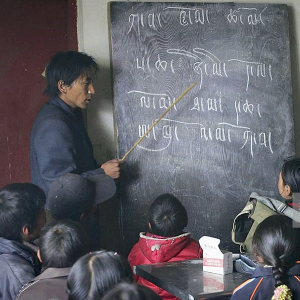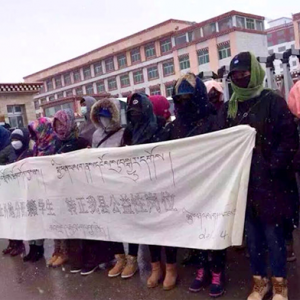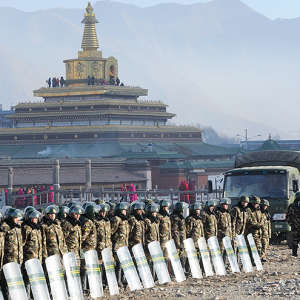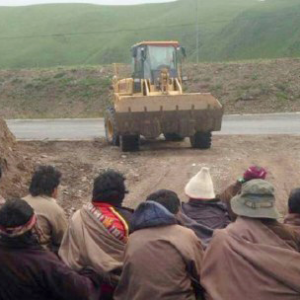Freya Putt, June 25, 2015 In recent years, I’ve noticed an increasing trend of articles and commentaries examining the Dalai Lama’s life and legacy that conclude Tibetans, and he as their leader, have failed in their cause to restore freedom to Tibet. Having worked for this movement for 18 years, I can understand having doubts...
Author: Tibet Action Institute (Tibet Action Institute)
POLITICAL RIGHTS
Authoritarian regimes can often seem too difficult to topple. But history shows that when mass numbers of people unite, they can achieve political rights even in the most brutal political systems. Learn how!
LANGUAGE RIGHTS
Language is critical to maintaining culture and identity for people around the world. In Tibet, despite China’s systematic attempt to stamp out the Tibetan language, Tibetans continue to press for their rights.
ECONOMIC JUSTICE
Tibet is resource rich, exploited by China’s occupation. Like other communities, Tibetans are fighting practices that largely benefit outside interests, asserting their right to control their economies.
CULTURAL & RELIGIOUS RIGHTS
Religion and culture form the very fabric of Tibetan society. Through cultural expressions like dance, dress, and ceremonies, Tibetans are asserting their identity as Tibetan, including their right to religious freedom.
ENVIRONMENTAL PROTECTION
Environmental protection is a pressing global issue of our time. In Tibet, as around the world, countless inspiring people and communities are stopping mining, protecting endangered species, starting eco-tourism projects, and more.
How Does Nonviolent Change Happen?
To most people, the process by which change occurs is a great mystery that takes place inside the black box of politics. Most of the time, those pushing for political change recognize the important ingredients that go into the process and the outcome that results from it. But between the input of ingredients and the...
འཚེ་མེད་ཞི་བའི་འགྱུར་བ་ཇི་ལྟར་འབྱུང་ངམ།
མི་ཕལ་ཆེ་བར་མཚོན་ན། འགྱུར་བ་ཇི་ལྟར་འབྱུང་བའི་གོ་རིམ་ནི་ཆབ་སྲིད་ཀྱི་སྒམ་ཆུང་ནག་པོ་དེའི་ནང་དུ་ཡོད་པའི་གསང་བ་ལྐོག་གྱུར་བ་ཞིག་རེད་། དུས་ཚོད་ཕལ་ཆེ་བར། ཆབ་སྲིད་ཀྱི་འགྱུར་བ་ལ་ཤུགས་སྣོན་བྱེད་མཁན་དག་གིས་འགྱུར་བ་ཡོང་བའི་གོ་རིམ་ཁྲོད་དུ་གནད་དོན་གལ་ཆེ་བ་གང་དག་ཡིན་མིན་དང་དེ་དག་གིས་བསྐྱེད་པའི་འབྲས་བུ་ཅི་ཞིག་ཡིན་མིན་སོགས་རྟོགས་ཀྱི་ཡོད་པ་རེད་། ཡིན་ན་ཡང་། འགྱུར་བའི་གོ་རིམ་དང་གྲུབ་འབྲས་གཉིས་ཀྱི་དབར་དུ་སྒམ་ཆུང་ནག་པོ་དེའི་ནང་དུ་ཅི་ཞིག་འབྱུང་གི་ཡོད་དམ། འགྱུར་བ་ཡི་མ་ལག་དག་གིས་ལས་ཀ་ཇི་ལྟར་བྱེད་ཀྱི་ཡོད་དམ། ཆབ་སྲིད་ཀྱི་འགྱུར་བ་འགྲོ་སྟངས་ཀྱི་རྒྱུད་རིམ་སྐོར་ལ་བསྟན་རྡོར་གྱིས་འགྲེལབརྗོད་བྱེད་པ་འདི་གསན་རོགས།
Top 10 Reasons World Leaders Should Meet with the Dalai Lama
1. It’s the right thing to do. The Dalai Lama is a Nobel Peace laureate, one of the foremost symbols of nonviolence in the history of humankind and the leader of an ancient nation being violently oppressed by China. Enough said. 2. Shines a global spotlight on Tibet, one of the darkest corners of the...
TAI screens documentary on cyber threat for Tibetans, gives presentation on WeChat perils
Nathan Freitas, founder of the Guardian Project Nathan and Director of Technology at Tibet Action Institute, speaks at the screening of a documentary ‘Tibet: Frontline of the New Cyberwar’, McLeod Ganj, January 28, 2015/Phayul Photo: Kunsang Gashon DHARAMSHALA, January 28: The Tibet Action Institute (TAI), a New York based group that works towards cyber security...








